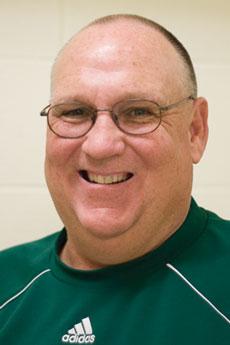Rutledge turns boys into men

Tom Rutledge – Head Coach Men’s Cross Country
At the beginning of his career as a coach, his blue eyes weren’t as tired as they are now, nor did he have the limp in his step.
As Tom Rutledge, men’s track and field and cross country coach, sits down to his desk in the bowels of the Leggett & Platt Athletic Center. He lets out a deep sigh. The Missouri Southern track and field coach looks at his watch, which has all the names and numbers of all his track athletes, male and female. It is now 6:20 p.m. He has 10 minutes before the evening cross country practice. The young men on his team have already pounded out seven miles on the city streets today, and they will add 10 more before sunset.
Coach doesn’t coddle his runners. During the heat of the cross country season, his men average upwards of 90 miles per week.
At first, when his runners were freshmen, they didn’t understand why he cracked the whip so hard. But once they tasted their first MIAA conference championship, they savored every bit of training advice. Coach is a good talker and motivational speaker; it shows because his athletes quote him all the time. They hoard these bits of encouragement and prophecy and summon them from their tired minds during a hard practice. This is how boys become men on the cross country team. Once they cross the line to manhood, Coach won’t let anyone call them boys, not even reporters who slip up.
Coach Rutledge is a stern man when it comes to training. He pushes his athletes to their full potential. The men know not to cross him or his blood pressure rises with his voice. He’s helped his men through injuries, poor grades, and ineligibility and his teams have more conference titles than any other program at Missouri Southern.
Even the international mission has its place on his team. His two current international runners are from Finland. Aki Nummela and Jarkko Jarvenpaa were required to serve in the Finnish military after high school. Blond-haired, bronzed and looking to carry on their running careers in America, they found Coach Rutledge.
The two come to visit him in his office quite frequently and, amidst all the teasing of ineligibility last season and injuries, they know that Coach likes them. Earlier today he offered to help them find a car to replace the “Finn-mobile,” a clunker they bought last year on which they painted the Finnish flag. Laughing, Coach recounts the time last Christmas when the Finns took the “Finn-mobile” to Colorado without a spare tire.
“Crazy foreigners,” he says with a smile.
Aki and Jarkko grin at the “Old Man,” as his athletes fondly call him, as he chuckles and gives them a bewildered look. The two Finns came with high recommendations and, considering the last Finn to come through Southern’s program was a four-year All-American in the javelin, Coach has high expectations.
He also expects a lot of his men while they are not at practice. He takes pride in his recruiting and aims to have a respectable team among Southern athletics. He brags about his athletes’ grades as much as he does their performances at meets. Coach wants to develop good, hard-working young men to their full-potential when they come to his program. His legacy is in his students and he knows that. Coach has former athletes all around the world and keeps in touch with them and occasionally pays them a visit.
Some of them even come back to the program as an assistant coach or a graduate assistant. One of the three who came back last year was his youngest son, Kyle.
Kyle is currently getting his Master of Arts in Teaching at Missouri State University and wants to coach after he graduates.
“I don’t know why he wants to,” Tom said.
“It’s a hard job because there are so many ups and downs. But if you can handle it, go ahead.”
Ironically, Tom Rutledge learned the art of coaching by being denied its benefits. In the 1970s, he played football at Ouachita Baptist University and also threw the shot put and discus. However, he and his teammates were self-taught because their coach never gave them instruction or tips. After a meet, they would go find their coach and tell him how they did, or, moreover, tell their coach’s back how they did as he walked away saying, “Good, good, keep it up.”
Rutledge learned to count on other athletes at meets to give him pointers instead. He vowed he would never be a coach like that for his athletes. He would always give them the support, encouragement, and attention necessary for them to succeed in life, whether in the classroom or at practice.
And with this, he hobbled out of his office, his eyes now sparkling, at 6:25 p.m. to go relax with the men, chat and play Uno before practice.
Your donation will support the student journalists of Missouri Southern State University. Your contribution will allow us to purchase equipment and cover our annual website hosting costs.



























